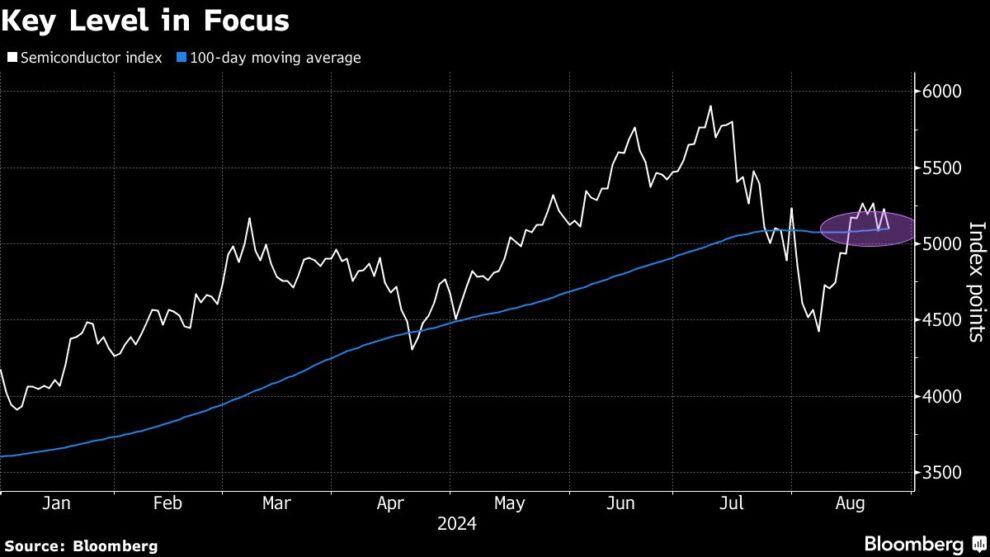
(Bloomberg) — Investors have been increasingly asking when software companies will start to see a return on the investments they’ve made into artificial intelligence. Results from Salesforce Inc. could provide clarity into this key question.
Most Read from Bloomberg
While spending on AI-related hardware like chips and servers remains robust, and major companies recently affirmed AI-related capex plans, the picture has been very different for companies offering AI features and services. Software stocks have struggled in 2024, lagging far behind other areas of the technology sector amid growing impatience over when AI will manifest faster growth and improved efficiencies.
Salesforce is at the forefront of this issue. The maker of customer-relations software has touted the potential for AI to boost revenue, but last quarter it projected the slowest sales growth in its history, sparking its biggest one-day selloff since 2004. If Salesforce’s upcoming results, due Wednesday afternoon, indicate it’s no closer to an AI inflection in growth, that could cast new suspicion on the sustainability of the overall AI trade.
“We’re looking for much greater clarity about when AI growth will really come in, and the more you push out when, the more you start to question if it will happen at all,” said Dave Mazza, chief executive officer at Roundhill Investments. “If Salesforce can only muster single-digit growth, then it doesn’t look like a screaming buy, and if AI isn’t going to pay off until 2025 or later, then investors will have a short leash for software in general.”
The boost from AI spending has supported chipmakers and hardware companies this year. The primary index for semiconductor companies is up 25% this year, above the 17% gain of the Nasdaq 100 Index, and much better than the 6.8% rise for an index that tracks software stocks. Salesforce is little changed for the year, falling roughly 1% on Tuesday.
Even though some investors remain optimistic that AI will translate into better trends for software over the long term, recent results have dashed hopes for a quick uptick. While 88% of software companies in the S&P 500 have beaten earnings expectations this season, only 41% have for sales, according to data compiled by Bloomberg. For the overall tech sector, the beat rates stand at 81.5% for earnings and 61% for revenue.
Last week, shares of Snowflake Inc. dropped after it gave an outlook that failed to reassure investors about its position with respect to AI. However, Workday Inc. shares climbed after signaling a greater focus on profitability.
Whether Salesforce results are greeted like Snowflake’s or Workday’s will have broad implications, as the the company is the third-largest component of the software index by market capitalization, behind Microsoft Corp. and Oracle Corp.
Even with its underperformance this year, Salesforce trades around 6.4 times estimated sales, near its long-term average. It also trades at 25 times estimated earnings, a sharp discount to its 10-year history, and slightly under the Nasdaq 100’s multiple of 25.7.
Salesforce’s has taken other steps to ease investor concerns. It initiated a dividend earlier this year and expanded its stock buyback plan by $10 billion.
Still, investors remain focused on growth. Revenue is expected to rise 8.6% this fiscal year, slower than last year’s pace of 11%, according to data compiled by Bloomberg. While growth is expected to pick up moderately in coming years, net earnings are seen slowing from 45% growth this year to 17% in fiscal 2026.
“I still think Salesforce will be one of the primary beneficiaries from AI, but while I had hoped to see an impact by the end of this year, I’ve had to push that out to the second half of 2025,” said Hilary Frisch, senior research analyst at ClearBridge Investments.
“If the AI picture looks much brighter a year from now, then the stock is probably extremely attractive. However, I’m not sure this will be the quarter where we look and say the clouds have cleared. It’s far from a slam dunk.”
Tech Chart of the Day
The Philadelphia Stock Exchange Semiconductor Index has been volatile ahead of the release of results from Nvidia Corp. later this week, but the chipmaker benchmark could find support at its 100-day moving average. The index has twice closed near the level in recent sessions. Breaking decisively above or below it could be an indicator of momentum trends over the medium term. The index fell 2.5% on Monday, its sixth straight session with a move greater than 1% in either direction.
Top Tech Stories
-
One of the last remaining bright spots for Chinese consumption is rapidly fading, as the nation’s economic malaise takes a toll on demand for even the most accessible of goods.
-
Producer David Ellison’s Skydance Media is set to become the new owner of Paramount Global after Seagram Co. heir Edgar Bronfman Jr. dropped out, ending one of the industry’s most dramatic acquisition contests.
-
JD.com Inc. plans to buy back as much as $5 billion of its shares, moving to appease investors worried about a potentially worsening Chinese consumer downturn.
-
A mission that would have reduced US government reliance on Elon Musk’s SpaceX is ending with NASA turning to it for help, highlighting the influence the billionaire and his closely held company have over America’s ambitions in outer space.
-
Meta Platforms Inc. Chief Executive Officer Mark Zuckerberg alleged that Facebook was “pressured” by the US government to censor content related to Covid-19 during the global pandemic and that he regrets the company’s decision to accede to the demands.
Earnings Due Tuesday
-
Premarket
-
ScanSource
-
-
Postmarket
-
SentinelOne
-
Box
-
nCino
-
Semtech
-
Ambarella
-
Vnet Group
-
Ooma
-
Joyy
-
–With assistance from Subrat Patnaik.
(Updates to afternoon trading.)
Most Read from Bloomberg Businessweek
©2024 Bloomberg L.P.








